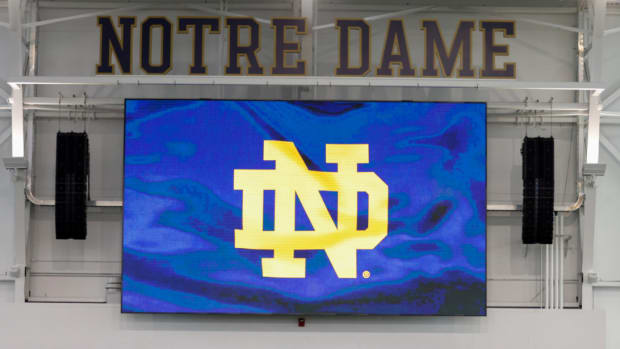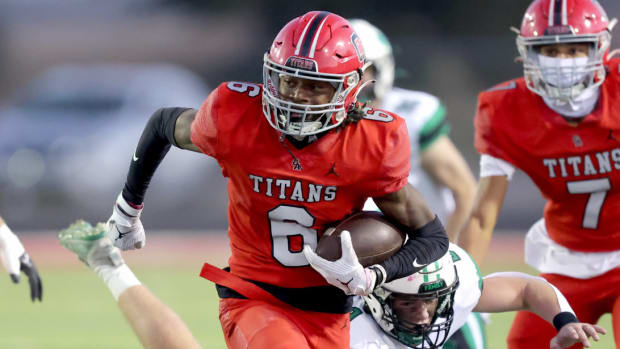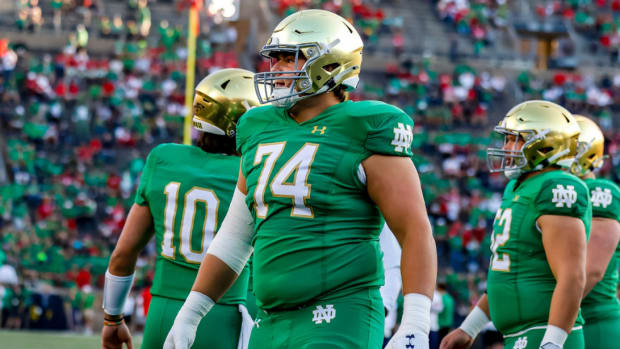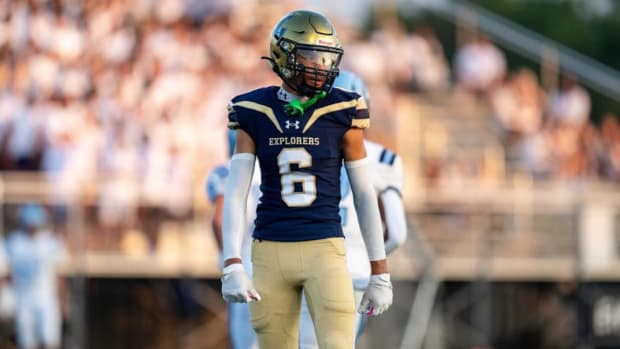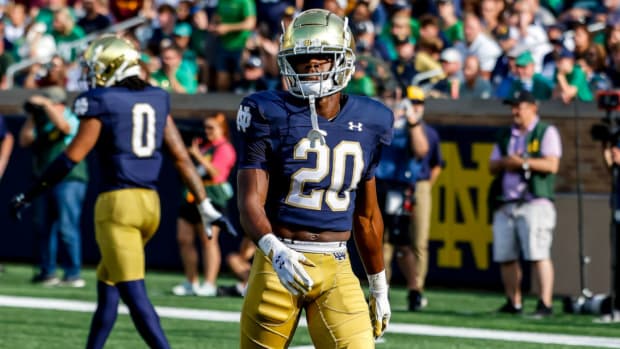Notre Dame Passing Game Needs To Vastly Improve ... And It Can
Notre Dame has been a dominant running team through the first four games of the season, with the Irish ranking seventh in the country in rushing at 261.0 yards per game.
If you look back through Kelly’s 11 seasons at Notre Dame, this is the third best rushing mark after four games, behind only the 2017 (293.5) and 2015 (284.8) offenses.
Notre Dame has feasted on a soft schedule, and not one of Notre Dame’s four opponents currently has a winning record. That will not change over the next two weeks. For Notre Dame, the true test is still three weeks away when the No. 1 Clemson Tigers come to town.
Notre Dame has an offensive line and a group of running backs and tight ends to do damage against the Tigers, but to have a chance to beat Clemson, win the ACC Championship and actually do damage in the College Football Playoff, the Irish pass attack needs to make vast improvement.
I do not care about Notre Dame ranking 64th in passing yards (out of 77 teams), because when you run the ball like they do and play soft competition you likely aren’t going to throw for a bunch of yards.
The numbers that show the struggles of the Irish pass attack are that Notre Dame ranks 46th nationally in passing efficiency, 32nd in yards per pass attempt and 41st in yards per pass completion. That’s the bottom half of the country nationally in two of the three primary statistics that gauge the effectiveness of the pass game.
With being a more balanced football team, the Notre Dame offense will feast on inferior opponents but will struggle when the competition is more on its level. Head coach Brian Kelly knows his team must be more balanced, and today during his press conference he gave a great description of what it means to be balanced.
“When I talk about balance from an offensive structure, I've always talked about the ability to be equally as effective throwing it is running it,” Kelly explained. “Right now, we're so much better running it than throwing it, I want the ability for teams to respect our ability to throw it and we came out with, with the intention that you needed to respect our ability to throw.”
Following the 12-7 victory over Louisville, a game in which the Irish passed for just 106 yards against one of the worst passing defenses in college football, quarterback Ian Book noted the plan early on was to focus on the pass game. Kelly said something similar during his Monday press conference, but obviously it was not successful.
“We did not complete enough passes, where we had opportunities to push the ball down the field,” Kelly stated. “So that's going to continue to be a priority in our focus that we're going to push the ball vertically down the field and we're going to have to be better at it. So that's going to be a focus and a priority, as we continue to strengthen this football team.”
That all sounds good, but simply wanting to throw the ball better and calling more pass plays early (Notre Dame called eight pass plays on its 12-play opening drive). It’s not just about the quarterback needing to play better, and Book needs to play better. A big part of it is having an identity as an offense, and simply being good at running the football is not an identity.
Notre Dame needs to have a pass attack that is built around that strong rushing attack, and right now those two parts of the offense aren’t on the same page. There are several problems with the pass offense that must be addressed, and they aren’t minor tweaks, either.
1. Build Around The Tight Ends And Backs — I would argue that two of Notre Dame’s three most talented pass catchers are tight ends Tommy Tremble and Michael Mayer. That duo was targeted just four times against Louisville and three times against Florida State. Think about that, in the last two games arguably two of your three most talented pass catchers were targeted a combined seven times.
If you’re going to build your ground attack around your two tight end alignment, the pass game needs to also be built around it, and that’s not happening right now. Tremble and Mayer need to become a much bigger part of the pass offense on every level.
The same is true of the running backs. I like that offensive coordinator Tommy Rees is using the running back screen game more effectively this season, but the pass game role of the backs needs to be expanded.
We need to see more free release routes by the backs, especially over the middle of the field where they can attack opposition linebackers. Having to worry about Williams and Tyree on quick underneath routes makes it much harder for linebackers to also defending the crossing routes and the tight end routes.
Using the backs for big plays down the field would also be a wise idea. Look what Louisville did to Notre Dame on Saturday. The Irish secondary was locking down its talented wide receiver duo of Tutu Atwell and Dez Fitzpatrick, so Louisville called up a wheel route to running back Javian Hawkins, and that 29-yard reception set up their only score of the game.
That’s the kind of route I called for from Chris Tyree and Kyren Williams prior to the game, and Louisville showed why it’s smart to use it. Here’s another aspect of that, when you have success throwing to your backs past the line of scrimmage it then makes your screen game more effective.
2. Can’t Push Vertically With The Current Personnel — Kelly talked about wanting to push the ball down the field, but that’s not going to be possible against most defenses when you line up the way Notre Dame did on Saturday. The staff asked Javon McKinley and Ben Skowronek to attack vertically, and that’s not ideal. McKinley can do damage up the sideline on back shoulders, but when they are on the field together no defense with a pulse is going to be worried bout them beating them down the field.
This isn’t a knock on McKinley or Skowronek; both players are talented and bring value to the offense. The issue is how they are being used, and the fact the staff is asking them to excel in areas where their game is not ideally suited.
That is an area where Kevin Austin needs to be used more, and it’s an area where Braden Lenzy can attack when healthy, but the problem with Lenzy throughout his career is he can’t stay healthy. You can’t build your offense around a player who is such a question mark week after week from a health standpoint.
Using the tight ends and backs to attack vertically should help, but that can’t be your bread and butter when it comes to attacking vertically. Notre Dame needs to do a better job with its personnel to put players on the field that can stretch the field more effectively.
So far this season Notre Dame has chosen to go with size, blocking prowess and experience over vertical ability. It’s no wonder that pushing the ball down the field is a problem.
3. Alter Your Scheme — Notre Dame’s pass concepts are not tied into what they do running the ball, and that needs to be adjusted. Notre Dame is running a lot of vertical scheme concepts, and that’s fine, but they need to either alter the personnel they use to attack with those routes, or adjust their schemes to fit the personnel they are using.
Many of the route concepts are slow developing, and there needs to be more diversity to how they attack. More quick game, more tempo, more attacking the middle of the field, more use of the running backs past the line, be more aggressive with your tight ends.
I’d also like to see Notre Dame do more double moves and post-snap switch concepts when attacking with their current pass game concepts. These are easy fixes, and they are fixes the staff needs to be willing to look at and adapt over the next two games.
4. Bring Pack RPOs … Immediately — For some reason Notre Dame has decided to remove the RPO (Run Pass Option) concepts from their offense. That needs to change, immediately.
If you are going to be a dominant run team out of the shot gun you absolutely must incorporate RPO concepts. We saw that against Louisville, as the Cardinals just flew their safeties downhill and tried to outnumber the Irish in the run game. The good news for Notre Dame is their offensive line and tight ends were just way better than Louisville’s defenders. That won’t always be true, and there will be games where opponents will be able to effectively out-number the Notre Dame ground attack.
Part of having a big-play pass attack when you run like Notre Dame is having a strong RPO package where you can steal yards. Imagine hitting Kevin Austin on a quick post/deep slant route behind a safety that reads run, or Book being able to pull it and throw it outside to Tremble, Mayer or Avery Davis when the linebackers read run.
Play-action passes are nice, and they need to be used more effectively as well, but play-action isn’t the same as an RPO. A play-action pass requires the call to be right, and it’s about making sure you make the call against the right look at the right time. An RPO is more dependent on what the defense does post-snap, regardless of the play-call. You can either run the ball or effectively run a play-action look, and instead of it being a well-called play by Rees it’s about you 27-game starter making a good decision.
Asking Rees to always make the right call is unwise, and that’s true for any coordinator. A coach is going to make calls that aren’t ideal, or a defense is going to make the right call against your personnel, and in those situations a play-action pass requires great execution and supreme talent. An RPO gives an offense a much greater margin for error from a play-calling standpoint, and takes some of that pressure off Rees.
Are you really going to ask your 28-year old offensive coordinator, as brilliant as he seems to be, to go call for call with Brent Venables (Clemson), Kerry Coombs (Ohio State) and Kirby Smart (Georgia)?
It’s also a tremendous complement to a powerful ground attack.
5. Change Your Philosophy — Kelly seems to pride himself on an expanded pass game package, and that advanced package has always made it hard for younger players to get a lot fo action. In an era where the teams winning championships are putting less emphasis on volume of scheme and more emphasis on building around the talent, Notre Dame has remained steadfast …. and stubborn.
It’s the reason when Notre Dame played Georgia in 2017, you had Chris Finke, Cameron Smith and Freddy Canteen combining for over 100 snaps while Chase Claypool, Miles Boykin and Cole Kmet combined for 12. Kevin Austin, Braden Lenzy, Lawrence Keys III and Tommy Tremble combined for a total of 0 snaps in Notre Dame’s playoff loss to Clemson.
Notre Dame averaged 185 passing yards per game, 5.0 yards per pass attempt and just 10 yards per reception in those two games … both losses. So it’s not like the pass game was working with those talented players sitting on the sideline.
It’s the reason a player like Will Fuller only had six catches as a freshman in 2013. Am I to believe that Fuller went from a 6-catch talent as a freshman to a 76-catch talent in just one season? Or was Notre Dame forced to play him more in 2014 after DaVaris Daniels was suspended, which allowed Fuller to show off the tools that were already there?
Football is a complex game in many ways, but it’s also a simple game when it comes down to it. The best teams take the talent they have, find out what that talent can do well and then build around it. Notre Dame’s coaches stubbornly not finding ways to get talented freshmen Xavier Watts and Jordan Johnson on the field in some capacity is hurting them, and the staff has cost them valuable early season reps against bad teams that could have helped them in November.
It’s not too late to rectify this mistake, but it needs to happen now. This means getting Johnson and Watts about 5-10 snaps a game, and finding two to three things they do well and giving them an opportunity to build confidence. You’re telling me Watts doesn’t know how to execute a jet sweep or a crossing route? Or Johnson can’t run a hitch route?
This isn’t about benching anyone that is currently playing, it’s about supplementing them, and using them in areas where they thrive, and using the freshmen in areas where they thrive. McKinley can and should be a key part of the pass game, but he has to be used correctly.
When your wide receivers are struggling as much as Notre Dame’s are, and you have players with their athletic talent on the bench, and the justification is they don’t know enough yet, or don’t have the confidence yet, that’s a coaching issue, not a player issue.
Simply waiting on everyone to get healthy, or making minor tweaks isn’t going to fix anything. Notre Dame needs to be willing to look deep into their soul as a program and be willing to make the necessary changes. If they do that, this offense will get on track and this could end up being a very special season. The tools are there, they just need to be used.
———————
Become a premium Irish Breakdown member, which grants you access to all of our premium content, our premium message board and gets you a FREE subscription to Sports Illustrated! Click on the link below for more
Be sure to stay locked into Irish Breakdown all the time!
Join the Irish Breakdown community!
Subscribe to the Irish Breakdown podcast on iTunes.
Follow me on Twitter: @CoachD178
Follow me on Parler: @BryanDriskell
Like and follow Irish Breakdown on Facebook
